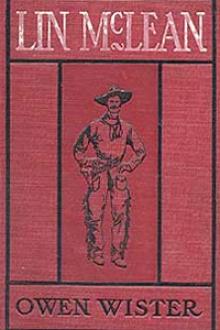The Girl from Sunset Ranch, AMY BELL MARLOWE [mini ebook reader txt] 📗

- Author: AMY BELL MARLOWE
Book online «The Girl from Sunset Ranch, AMY BELL MARLOWE [mini ebook reader txt] 📗». Author AMY BELL MARLOWE
Helen had to wait only a short time; but during that wait she was aware that she was being watched by a pair of bright eyes at a crevice between the portières at the end of the hall.
"They act as though I came to rob them," thought the girl from the ranch, sitting in the gloomy hall with the satchel at her feet.
This was not the welcome she had expected when she started East. Could it be possible that her message to Uncle Starkweather had not been delivered? Otherwise, how could this situation be explained?
Such a thing as inhospitality could not be imagined by Helen Morrell. A begging Indian was never turned away from Sunset Ranch. A perfect stranger--even a sheepman--would be hospitably treated in Montana.
The soft patter of the footman's steps soon sounded and the sharp eyes disappeared. There was a moment's whispering behind the curtain. Then the liveried Englishman appeared.
"Will you step this way, Miss?" he said, gravely. "Mrs. Olstrom will see you in her sitting-room. Leave your bag there, Miss."
"No. I guess I'll hold onto it," she said, aloud.
The footman looked pained, but said nothing. He led the way haughtily into the rear of the premises again. At a door he knocked.
"Come in!" said a sharp voice, and Helen was ushered into the presence of a female with a face quite in keeping with the tone of her voice.
The lady was of uncertain age. She wore a cap, but it did not entirely hide the fact that her thin, straw-colored hair was done up in curl-papers. She was vinegary of feature, her light blue eyes were as sharp as gimlets, and her lips were continually screwed up into the expression of one determined to say "prunes."
She sat in a straight-backed chair in the sitting-room, in a flowered silk bed-wrapper, and she looked just as glad to see Helen as though the girl were her deadliest enemy.
"Who are you?" she demanded.
"I am Helen Morrell," said the girl.
"What do you want of Mr. Starkweather at this hour?"
"Just what I would want of him at any hour," returned the Western girl, who was beginning to become heartily exasperated.
"What's that, Miss?" snapped the housekeeper.
"I have come to him for hospitality. I am his relative--rather, I am Aunt Eunice's relative----"
"What do you mean, child?" exclaimed the lady, with sudden emotion. "Who is your Aunt Eunice?"
"Mrs. Starkweather. He married my mother's sister--my Aunt Eunice."
"Mrs. Starkweather!" gasped Mrs. Olstrom.
"Of course."
"Then, where have you been these past three years?" demanded the housekeeper in wonder. "Mrs. Starkweather has been dead all of that time. Mr. Willets Starkweather is a widower."
"Aunt Eunice dead?" cried Helen.
The news was a distinct shock to the girl. She forgot everything else for the moment. Her face told her story all too well, and the housekeeper could not doubt her longer.
"You're a relative, then?"
"Her--her niece, Helen Morrell," sobbed Helen. "Oh! I did not know--I did not know----"
"Never mind. You are entitled to hospitality and protection. Did you just arrive?"
"Yes, ma'am."
"Your home is not near?"
"In Montana."
"My goodness! You cannot go back to-night, that is sure. But why did you not write?"
"I telegraphed I was coming."
"I never heard of it. Perhaps the message was not received. Gregson!"
"Yes, ma'am," replied the footman.
"You said something about a taxicab waiting outside with this young lady's luggage?"
"Yes, ma'am."
"Go and pay the man and have the baggage brought in----"
"I'll pay for it, ma'am," said Helen, hastily, trying to unlock her bag.
"That will be all right. I will settle it with Mr. Starkweather. Here is money, Gregson. Pay the fare and give the man a quarter for himself. Have the trunk brought into the basement. I will attend to Miss--er----?"
"Morrell."
"Miss Morrell, myself," finished the housekeeper.
The footman withdrew. The housekeeper looked hard at Helen for several moments.
"So you came here expecting hospitality--in your uncle's house--and from your cousins?" she observed, jerkily. "Well!"
She got up and motioned Helen to take up her bag.
"Come. I have no orders regarding you. I shall give you one of the spare rooms. You are entitled to that much. No knowing when either Mr. Starkweather or the young ladies will be at home," she said, grimly.
"I hope you won't put yourself out," observed Helen, politely.
"I am not likely to," returned Mrs. Olstrom. "It is you who will be more likely---- Well!" she finished, without making her meaning very plain.
This reception, to cap all that had gone before since she had arrived at the Grand Central Terminal, chilled Helen. The shock of discovering that her mother's sister was dead--and she and her father had not been informed of it--was no small one, either. She wished now that she had not come to the house at all.
"I would better have gone to a hotel until I found out how they felt toward me," thought the girl from the ranch.
Yet Helen was just. She began to tell herself that neither Mr. Starkweather nor her cousins were proved guilty of the rudeness of her reception. The telegram might have gone astray. They might never have dreamed of her coming on from Sunset Ranch to pay them a visit.
The housekeeper began to warm toward her in manner, at least. She took her up another flight of stairs and to a very large and handsomely furnished chamber, although it was at the rear of the house, and right beside the stairs leading to the servants' quarters. At least, so Mrs. Olstrom said they were.
"You will not mind, Miss," she said, grimly. "You may hear the sound of walking in this hall. It is nothing. The foolish maids call it 'the ghost walk'; but it is only a sound. You're not superstitious; are you?"
"I hope not!" exclaimed Helen.
"Well! I have had to send away one or two girls. The house is very old. There are some queer stories about it. Well! What is a sound?"
"Very true, ma'am," agreed Helen, rather confused, but bound to be polite.
"Now, Miss, will you have some supper? Mr. Lawdor can get you some in the butler's pantry. He has a chafing dish there and often prepares late bites for his master."
"No, ma'am; I am not hungry," Helen declared. "I had dinner in the dining car at seven."
"Then I will leave you--unless you should wish something further?" said the housekeeper.
"Here is your bath," opening a door into the anteroom. "I will place a note upon Mr. Starkweather's desk saying that you are here. Will you need your trunk up to-night, Miss?"
"Oh, no, indeed," Helen declared. "I have a kimono here--and other things. I'll be glad of the bath, though. One does get so dusty traveling."
She was unlocking her bag. For a moment she hesitated, half tempted to take the housekeeper into her confidence regarding her money. But the woman went directly to the door and bowed herself out with a stiff:
"Good-night, Miss."
"My! But this is a friendly place!" mused Helen, when she was left alone. "And they seem to have so much confidence in strangers!"
Therefore, she went to the door into the hall, found there was a bolt upon it, and shot it home. Then she pulled the curtain across the keyhole before sitting down and counting all her money over again.
"They got me doing it!" muttered Helen. "I shall be afraid of every person I meet in this man's town."
But by and by she hopped up, hid the wallet under her pillow (the bed was a big one with deep mattress and downy pillows) and then ran to let her bath run in the little room where Mrs. Olstrom had snapped on the electric light.
She undressed slowly, shook out her garments, hung them properly to air, and stepped into the grateful bath. How good it felt after her long and tiresome journey by train!
But as she was drying herself on the fleecy towels she suddenly heard a sound outside her door. After the housekeeper left her the whole building had seemed as silent as a tomb. Now there was a steady rustling noise in the short corridor on which her room opened.
"What did that woman ask me?" murmured Helen. "Was I afraid of ghosts?"
She laughed a little. To a healthy, normal, outdoor girl the supernatural had few terrors.
"It is a funny sound," she admitted, hastily finished the drying process and then slipping into her nightrobe, kimono, and bed slippers.
All the time her ear seemed preternaturally attuned to that rising and waning sound without her chamber. It seemed to come toward the door, pass it, move lightly away, and then turn and repass again. It was a steady, regular----
Step--put; step--put; step--put----
And with it was the rustle of garments--or so it seemed. The girl grew momentarily more curious. The mystery of the strange sound certainly was puzzling.
"Who ever heard of a ghost with a wooden leg?" she thought, chuckling softly to herself. "And that is what it sounds like. No wonder the servants call this corridor 'the ghost walk.' Well, me for bed!"
She had already snapped out the electric light in the bathroom, and now hopped into bed, reaching up to pull the chain of the reading light as she did so. The top of one window was down half-way and the noise of the city at midnight reached her ear in a dull monotone.
Back here at the rear of the great mansion, street sounds were faint. In the distance, to the eastward, was the roar of a passing elevated train. An automobile horn hooted raucously.
But steadily, through all other sounds, as an accompaniment to them and to Helen Morrell's own thoughts, was the continuous rustle in the corridor outside her door:
Step--put; step--put; step--put.
CHAPTER X (MORNING)
The Starkweather mansion was a large dwelling. Built some years before the Civil War, it had been one of the "great houses" in its day, to be pointed out to the mid-nineteenth century visitor to the metropolis. Of course, when the sightseeing coaches came in fashion they went up Fifth Avenue and passed by the stately mansions of the Victorian era, on Madison Avenue, without comment.
Willets Starkweather had sprung from a quite mean and un-noted branch of the family, and had never, until middle life, expected to live in the Madison Avenue homestead. The important members of his clan were dead and gone and their great fortunes scattered. Willets Starkweather could barely keep up with the expenditures of his great household.
There were never servants enough, and Mrs. Olstrom, the very capable housekeeper, who had served the present master's great-uncle before the day of the new generation, had hard work to satisfy the demands of those there were upon the means allowed her by Mr. Starkweather.
There were rooms in the house--especially upon the topmost floor--into which even the servants seldom went. There were vacant rooms which never knew broom nor duster. The dwelling, indeed, was altogether too large for the needs of Mr. Starkweather and his three motherless daughters.
But their living in it gave them a prestige which nothing else could. As wise as any match-making matron, Willets Starkweather knew that the family's address at this particular number on Madison Avenue would aid his daughters more in "making a good match" than anything else.
He could not dower them. Really, they needed no dower with their good looks, for they were





Comments (0)